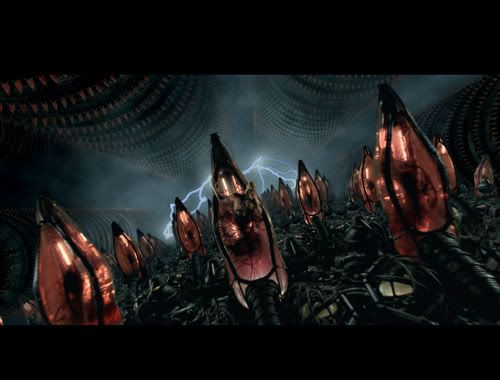
What did my cinema see? It saw everything and nothing; the disillusionment of the people – the spectator, the mother – and the photoplay itself. It began with the unease of the unknown – a stench of fear that has emanated from the cultures of yesteryear: the ticking collapse of the stock market plummet; the echoing tick of doomsday clock’s minutes to midnight. “Reality! Reality!” they shouted, humming a prayer that only those with skin can offer. But the culture evaporated when the zeroes returned with comrades. The 2000s hit us in every realm – what did the cinema capture?
The machine. The device, the apparatus itself. Us in transit, now stalled permanently. The dripping jail cell rot of the mirror stuck to Neo’s finger as he pulled back in The Matrix. He digests the silver, delivering a scream echoed out by the bloodcurdling ambience of a server disconnect. He is agonized, tortured, but free. The apparatus was the allure of the organic in the light of its barren scope -- the green tilt of nature now replaced with the neon glow of a digital code. Reality, thus, was the scarcity, and the machine was our artificial prevention from the ‘real’. To feel the natural and the return of the organic we must unplug ourselves and face the chrome-covered intensity of actuality.
A warning. A sincere hope that the pratfalls of the horrorshow before us would never mimic the world that watches. We attempted to refuse. Now in 2009, the scaled blue skin of the Avatar in James Cameron’s titular film, offers the same sense of ‘real’. The artificial digitations of the organic, and our complacent stupor with which we watch, all rested in 90-degrees with glasses the sizes of the reel itself gazed appropriately on the screen.

Avatar preaches the beauty of the organic and the desperate need to preserve its natural allure, yet it is a plea made through the machine, the inorganic preaching the power of the tangible. Those in the Matrix pods are depicted as victims to the development of the real, and we truly do succumb to its ease: “it’s not organic, but it’s close enough”. Now, we watch the cinema not for how it reflects reality, but how it resembles it. The goal is to force the unreal to mimic until it reaches secondary existence, a sort of doppelganger to the substantial – the cluster of starspark freckles scattered along the electric blue flesh of the Na’vi’s, looking as if it mimics the ‘real’ feel of Cameron’s cat-smurf blanket of skin.
We are watching the birth of the matrix. We aid in the disintegration of reality itself. I watch with disbelieving eyes as the people lay within the pods in an electronic embryonic state of being – electronic replaces umbilical, our eyes sag because we’ve never used them before. I laugh disbelievingly, nodding my head in faux-critique posture until days later I am transfixed like a saucer eyed cub at the artifice of reality on a screen that preaches disconnect as a virtue: “look at your size in comparison to your creation – the machine has surpassed you”.
I am hell bent to experience the experience. I arrive an hour before the electro-cinematic rolls tape. I am eager to become the pod, allowing the cinema of attractions to continue onward. I sit back and am presented at. The fetal positions that humans-turned-batteries find themselves in within the hollowed human grapevine looks comforting, and I slowly find myself crossing my legs a little closer than before, until I find both legs atop my cushioned theater seat, feeding the machine (both the cinematic, that, in the wise words of Christian Metz, doesn’t exist until I watch it, and the industry machine itself).
How have we gotten here in only ten years? The shift from the warning of 1999 to the complacent and subtle transformation in late 2009; we face extinction on a mass level, and I return to my fetal position for another fix of the fantastical, larger, brighter, closer to both reality and the audience. I am blinded, and worst of all, I am becoming the very thing I shook my head at so confidently. In the era of the nines, I rallied against the necessitation of the plug in. Now my cinema depicts the organic as only achievable through the process – Jake Sulley feels more alive within the electronically accessed natural world – and through the spectatorship. The nines are over; we are at the tail end of the zero decade, and our warning to ourselves went unnoticed, resigned simply as spectacle, not statement.

